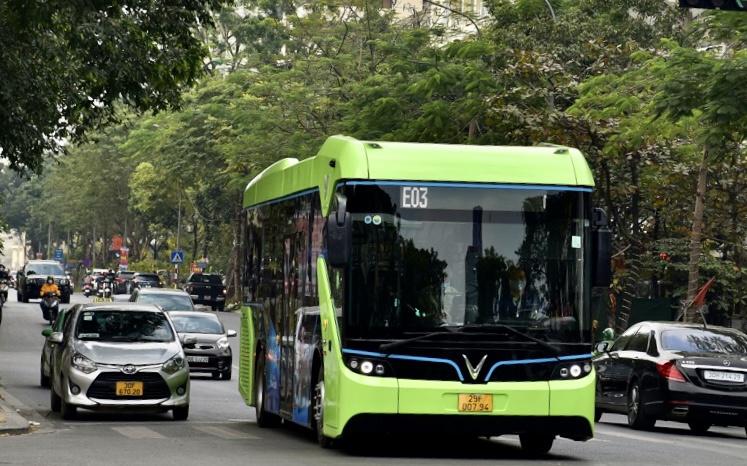Hanoi earmarks US$1.7 billion for green bus promotion
Hanoi aims for all new and replacement buses to be electric or to run on green energy by 2025.
Hanoi has set a target of 50% electric and 50% LNG/CNG buses by 2026-2030 at a cost of VND43 trillion (US$1.7 billion).
| Green bus on Hanoi's street. Photo: Pham Hung/The Hanoi Times |
The goal was mentioned in the Hanoi People's Committee’s proposal to the municipal People’s Council on developing a public transportation system using electric and green energy buses.
This initiative aligns with the Prime Minister's Decision No.876, dated July 22, 2022, which approves the action program for green energy transition, reducing CO2 and methane emissions in the transportation sector from 2022 to 2030.
As part of this decision, Hanoi aims for all new and replacement buses to be electric or run on green energy by 2025, and for all new and replacement taxis to follow suit by 2030. Based on the city's current situation, the Hanoi Department of Transport has outlined three scenarios for transitioning to electric and green energy buses between 2026 and 2030: 100% electric buses, 70% electric, and 30% LNG/CNG buses, and 50% electric and 50% LNG/CNG buses.
These scenarios involve the retrofitting of approximately 2,000, 1,000, and 1,500 buses, respectively, with total investment costs by 2033 projected at VND52 trillion ($2 billion), VND47 trillion ($1.8 billion), and VND43 trillion ($1.7 billion).
The Department of Transport recommends the third scenario (50% electric and 50% LNG/CNG buses) and proposes moving to the second scenario (70% electric, 30% LNG/CNG) when feasible, with a transition to 100% electric buses after 2040.
Currently, Hanoi allocates around VND2.3 trillion ($90.3 million) annually from the budget to subsidize bus services. To implement the transition to electric and green energy buses, an additional VND8.3 trillion ($326 million) will be required from 2024 to 2033, or VND831 billion ($32.6 million) per year.
At a recent consultative conference, former Vice Chairman of the Vietnam Fatherland Front Committee – Hanoi chapter Pham Ngoc Thao emphasized the need for this transition but stressed the need to clarify budget capabilities and consider a feasible timeline. Nguyen Van Vien, former Director of the Hanoi Department of Transport, also raised concerns about budget constraints and the adequacy of maintenance facilities for the new buses.
Hanoi currently operates 154 bus routes, including 132 subsidized routes, eight non-subsidized routes, 12 adjacent routes, and two City tour routes, managed by 11 operators. The fleet comprises 2,034 subsidized buses, of which 277 use clean energy.
The city’s proposal on promoting green and electric buses in Hanoi will be reviewed by the municipal People’s Council at its 17th session on July 1-4.












